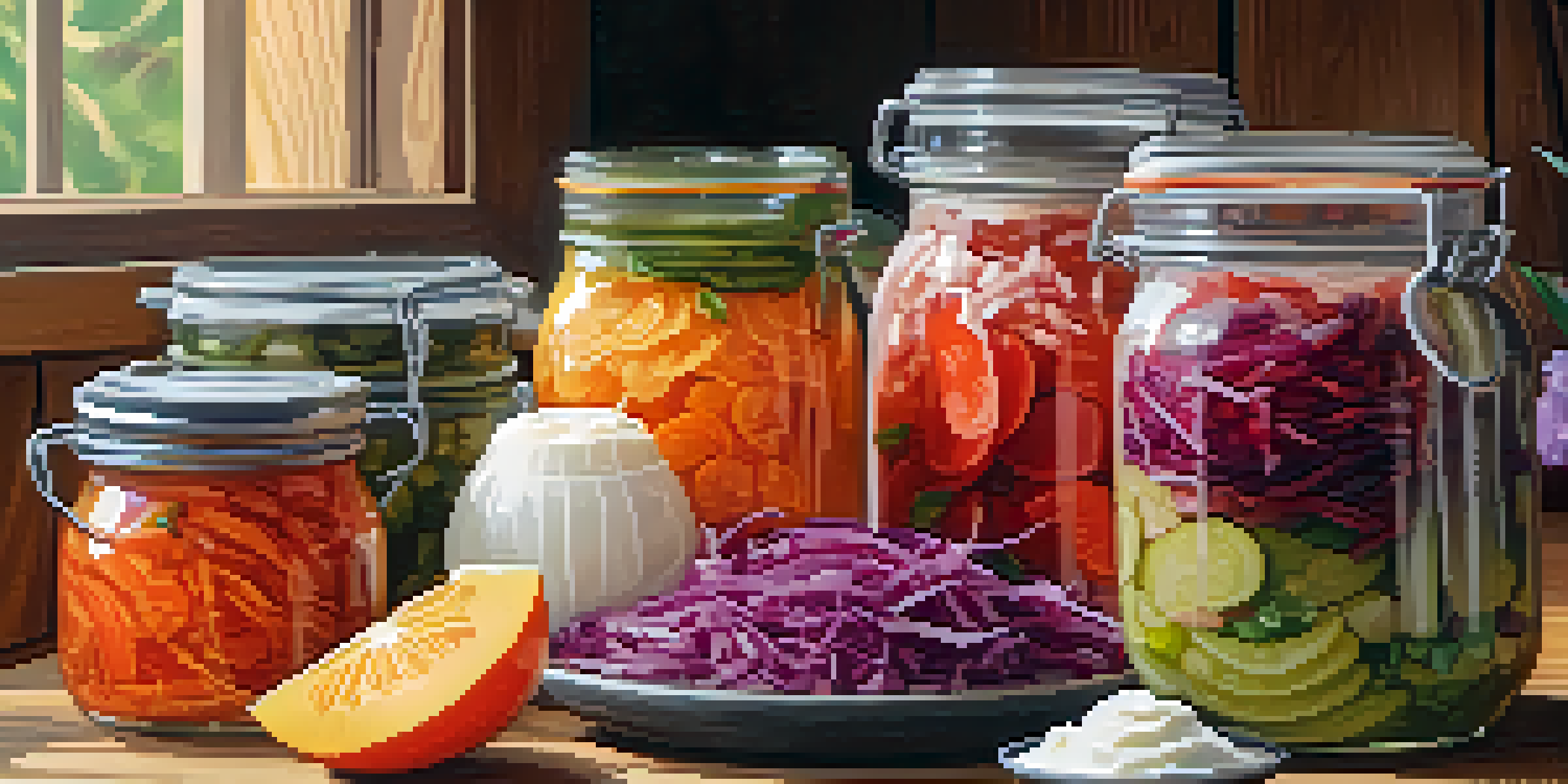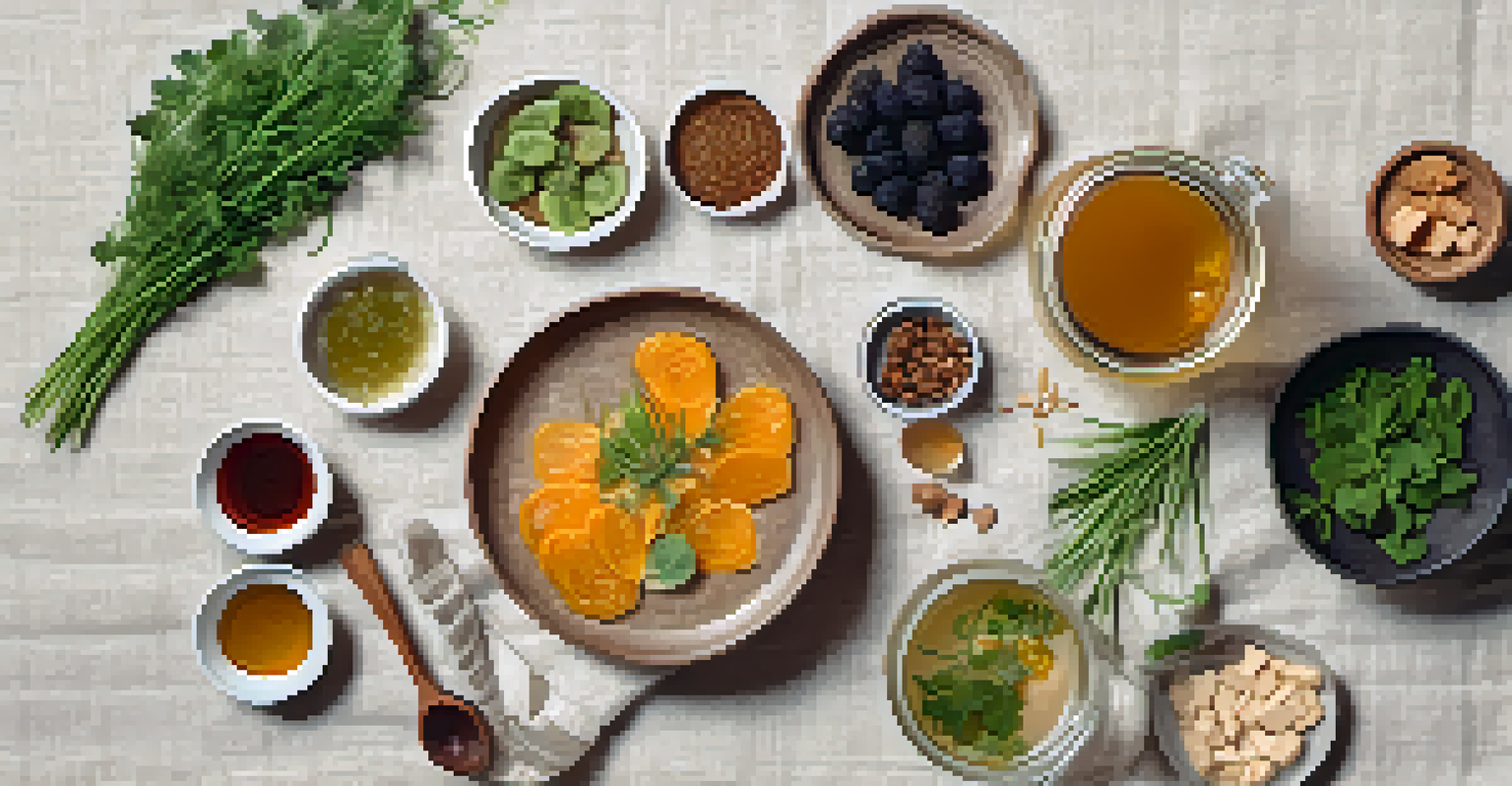Fermentation: The Science Behind Flavor in Vegan Foods

Understanding Fermentation: A Flavor Revolution
Fermentation is a natural process that transforms food, enhancing flavors and preserving freshness. In vegan cuisine, it plays a crucial role in developing complex tastes that mimic traditional animal-based products. By harnessing the power of microorganisms like bacteria, yeast, and molds, foods undergo chemical changes that elevate their flavor profiles.
Fermentation is the ultimate in culinary alchemy, transforming basic ingredients into something extraordinary.
Imagine biting into a tangy kimchi or a rich miso paste; these flavors come alive through fermentation. This ancient technique not only adds depth but also makes plant-based foods more enjoyable and satisfying. As vegans seek to replicate familiar tastes, fermentation emerges as a key player in the culinary landscape.
The beauty of fermentation lies in its versatility. From pickling vegetables to brewing beverages, the possibilities are endless. Each method introduces unique flavors, making it an exciting avenue for creativity in vegan cooking.
Key Microorganisms in Vegan Fermentation
The magic of fermentation relies heavily on specific microorganisms. Lactic acid bacteria, for instance, are essential in creating tangy flavors found in products like sauerkraut and yogurt alternatives. These tiny powerhouses convert sugars into lactic acid, resulting in that signature sour taste many of us love.

Yeast, another vital player, is responsible for the fermentation process in breads and alcoholic beverages. It converts sugars into alcohol and carbon dioxide, making our favorite vegan baked goods light and fluffy. Understanding these microorganisms helps us appreciate the science behind our food.
Fermentation Enhances Flavor
Fermentation transforms food, enriching flavors and preserving freshness, particularly in vegan cuisine.
Molds also contribute significantly to flavor development, particularly in products like tempeh and certain vegan cheeses. By breaking down complex carbohydrates and proteins, molds enhance texture and taste, bridging the gap between plant-based and traditional options.
The Role of Temperature and Time in Fermentation
Temperature and time are crucial factors that influence the fermentation process. Different conditions can either speed up or slow down the activity of microorganisms, directly impacting flavor development. For instance, a warm environment can accelerate fermentation, leading to a more pronounced tang.
The beauty of fermentation lies in the symbiotic relationship between humans and microorganisms, creating flavors that evoke tradition and innovation.
Conversely, cooler temperatures might slow down the process, allowing for more subtle flavors to emerge over time. This is why many fermentation recipes recommend specific conditions to achieve the desired taste and texture. Understanding how these variables interact empowers home cooks to experiment confidently.
Time is also essential; some fermented foods require days or even weeks to develop their unique flavors. Patience is key, and the reward is often a richer, more complex taste that transforms simple ingredients into culinary masterpieces.
Fermentation and Nutritional Benefits
Fermentation does more than enhance flavors; it also boosts nutritional value. The process can increase the bioavailability of nutrients, making them easier for our bodies to absorb. For example, fermented foods often contain probiotics, which are beneficial bacteria that support gut health.
This is particularly important in vegan diets, where certain nutrients may be less accessible. Fermented soy products like natto are rich in vitamin K2, crucial for bone health, while fermented vegetables are packed with vitamins and minerals. By incorporating these foods, vegans can enhance their overall nutrition.
Microorganisms Drive Fermentation
Key microorganisms like lactic acid bacteria, yeast, and molds are essential for developing unique tastes and textures in fermented foods.
Moreover, fermentation can reduce anti-nutrients found in some plant foods, such as phytic acid, which can inhibit the absorption of minerals. This means that fermentation not only makes our food tastier but also healthier, allowing us to enjoy our meals with peace of mind.
Popular Fermented Vegan Foods You Should Try
There’s a wide array of fermented vegan foods that can elevate your meals. Start with staples like sauerkraut and kimchi, which add a zesty kick to sandwiches and bowls. These fermented veggies are not only delicious but also packed with probiotics that support digestion.
Vegan yogurts and cheeses made from nuts and soy are also gaining popularity, thanks to fermentation. They provide creamy textures and rich flavors, perfect for adding to dishes or enjoying on their own. The diversity of these products opens up exciting culinary possibilities.
Don’t forget about beverages! Kombucha, a fermented tea, offers a refreshing twist and can be found in various flavors. It’s a delightful way to introduce fermentation into your diet while enjoying a fizzy drink that’s both tasty and gut-friendly.
How to Ferment at Home: A Beginner's Guide
Fermenting at home may seem daunting, but it’s surprisingly simple! All you need are some basic ingredients, a clean environment, and a little bit of patience. Start with easy recipes like pickles or sauerkraut, which require minimal equipment and ingredients.
The basic process typically involves combining your chosen vegetables with salt and sometimes water, then allowing them to sit at room temperature for a set period. This is where the magic happens as the natural bacteria on the vegetables begin to work their wonders, transforming them into tangy, flavorful goodness.
Nutritional Benefits of Fermented Foods
Fermented foods boost nutritional value by increasing nutrient absorption and introducing beneficial probiotics, making them vital for a balanced vegan diet.
As you gain confidence, you can experiment with different ingredients and flavors. Remember, each batch is a learning experience, so don’t be afraid to adjust the recipe to suit your taste. Enjoying the fruits of your labor is a rewarding part of the fermentation journey!
Embracing Fermentation for Flavorful Vegan Living
Incorporating fermentation into your vegan lifestyle opens up a world of flavors and textures. It encourages creativity in the kitchen and allows for a deeper connection to the food you eat. By understanding the science behind fermentation, you can appreciate the artistry involved in crafting delicious plant-based dishes.
Moreover, the health benefits of fermented foods make them a valuable addition to any diet. As we’ve seen, they can enhance digestion, boost nutrition, and introduce beneficial bacteria to our gut. All these factors contribute to a holistic approach to vegan living.

So, whether you're a seasoned vegan or just starting, dive into the world of fermentation. Embrace the flavors, experiment with new recipes, and enjoy the journey of transforming simple ingredients into flavorful delights.